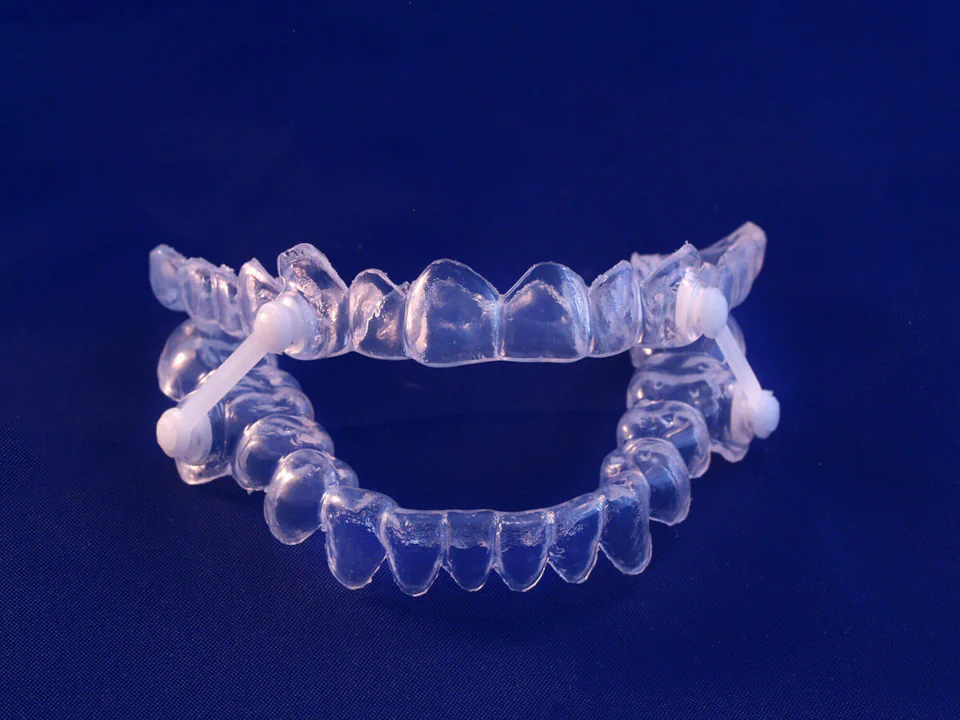Sleep Apnea Dental Treatments in Boston, MA
Sleep apnea is a serious condition that can result in significant health complications if left untreated. We offer effective treatments for many cases of sleep apnea to help enhance your overall health and well-being.
Improve your Sleep and Overall Health with Dental Sleep Apnea Appliances at Ace Dental Boston
Sleep apnea is a condition characterized by frequent interruptions in breathing during sleep. This often occurs when the throat muscles relax excessively, blocking the airways and disrupting normal breathing—a condition known as obstructive sleep apnea.
Common signs of sleep apnea include poor sleep quality, frequent sore throats, recurring headaches and difficulty achieving restful sleep.
We prioritize our patients’ overall health, including their sleep health. Many individuals unknowingly suffer from sleep disorders that disrupt oxygen flow at night, increasing the risk of serious health issues. People with sleep disorders face a 23-fold higher risk of heart attack, and 92% of stroke victims are unaware they had this condition prior to their stroke. Our specialized training allows us to provide education and treatment for sleep health in a simple and cost-effective manner.
If you’re seeking sleep apnea treatment near Boston, MA, we can help. We collaborate with your primary physician to develop a personalized treatment plan, often using a custom oral appliance. Call one of our offices today to schedule a sleep apnea consultation.

-
What is sleep apnea?
One of the most common sleep disorders in the U.S., sleep apnea is a sleep disorder characterized by repeated interruptions in breathing during sleep. These pauses reduce sleep quality and disrupt the body’s oxygen supply, potentially leading to serious health problems. There are three primary types of sleep apnea:
- Obstructive sleep apnea: The most common type, caused by the throat muscles relaxing excessively during sleep, which blocks the airways and disrupts normal breathing.
- Central sleep apnea: A rare form in which the brain fails to send proper signals to the muscles responsible for breathing, resulting in short periods of stopped breathing.
- Complex sleep apnea syndrome: Also known as treatment-emergent central sleep apnea, this occurs when a person experiences both obstructive and central sleep apnea.
Sleep apnea is often associated with loud, intense snoring, but not all snorers have the condition. Affecting both children and adults as well as people of all genders, sleep apnea can be triggered by factors such as being overweight, excessive alcohol consumption, drug use or genetics. The disorder is more prevalent in men than women, and a family history of sleep apnea increases the likelihood of developing the disorder.
-
What are the signs of sleep apnea?
Following are some of the most common signs of sleep apnea. Having one or more of these symptoms doesn’t necessarily mean you have the condition, so consult your doctor for an accurate diagnosis.
Common Symptoms of Sleep Apnea:
- Loud snoring
- Fatigue and low energy during the day
- Frequent headaches
- Restless or disrupted sleep
- Difficulty falling or staying asleep (insomnia)
- Waking up with a dry or sore throat
- Episodes of gasping or choking during the night
- Sudden mood swings
- Trouble focusing or concentrating
- Frequent nighttime trips to the bathroom
-
How is sleep apnea diagnosed?
Sleep apnea is typically diagnosed through a polysomnogram, commonly known as a sleep study. This test can be conducted at home or in a sleep disorder center. It monitors various activities while you sleep, including brain activity, breathing patterns, oxygen levels, the time spent in different sleep stages, the frequency of awakenings, episodes of stopped breathing, snoring and body positioning.
After the study, a specialist reviews the collected data, analyzing brain activity and body functions to determine whether a sleep disorder is present and to recommend appropriate treatment.
If treatment is needed, a dentist trained in sleep medicine can collaborate with the specialist to manage obstructive sleep apnea using oral appliance therapy. Our office offers custom sleep apnea oral appliances—contact us to schedule a consultation.
-
How is sleep apnea treated?
Treatment for snoring and obstructive sleep apnea (OSA) may include surgery, CPAP or BiPAP machines, or oral appliance therapy. Oral appliances are the least invasive option and are often an effective choice for mild to moderate OSA. These devices are designed to hold the jaw in a specific position during sleep, promoting proper oxygen flow.
It’s important to consult with your doctor to determine the best treatment plan. Once a consistent treatment approach is selected, we can provide essential support for your care. If oral appliance therapy is recommended, precise design and positioning are critical to ensuring that the airway remains open effectively.
Questions about sleep apnea treatment?
Contact us today with any questions about sleep apnea or if you believe you need treatment. We offer consultations and collaborative sleep apnea treatment as well as various other preventative, restorative and cosmetic dental services at our Hyde Park and West Roxbury locations.
